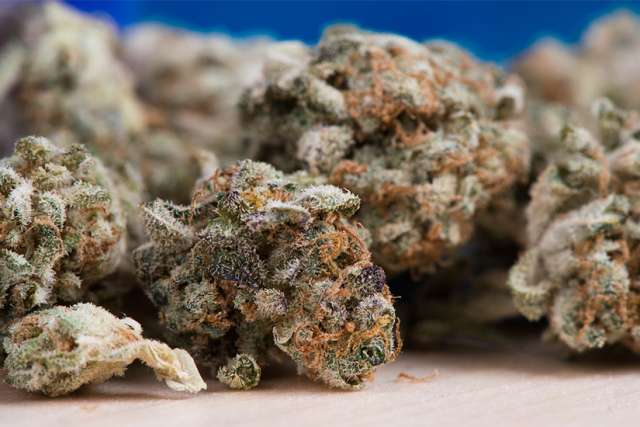The Ontario Cannabis Store will be the brand name of Ontario’s cannabis agency, including its stores and online channel, the Liquor Control Board of Ontario (LCBO) announced March 9 when unveiling OCS’s crisp, black-and-white logo.
Lest anyone may be confused about where customers can purchase pot, the OCS spells it out.
“We are confident the brand name and logo will help ensure Ontarians are able to safely and easily identify Ontario Cannabis Stores as the sole legal retailer of non-medical cannabis in Ontario,” says the Ontario Cannabis Retail Corporation Board of Directors, which, disturbingly, includes the Integrated Vice President of Finance and Chief Financial Officer at St. Joseph’s Health Centre and St. Michael’s Hospital.
The OCS, a subsidiary of the LCBO, is Ontario’s response to the federal government’s Bill C45, the Cannabis Act, expected to come into law in coming months. The province is carrying out what it calls a “safe and sensible transition” to cannabis legalization by opening 40 stores this year and ramping up to 150 stores by 2020.
Of course, says the province, to protect the “health and well-being” of children, youth and the vulnerable, no one under the age of 19 can “buy, sell, have and share recreational cannabis.” It can only be consumed in private residences and “drug-impaired driving laws” will be toughened up.
These provisions are cold comfort to those concerned about the health implications of cannabis, many of which are unknown and others highly contested.
Most scientists agree that cannabis harms the developing adolescent brain. It has been shown to have several harmful effects: impair short-term recall memory and decision-making; decrease IQ; alter brain structures and functions; and lead to slower psychomotor speed and poorer complex attention and planning ability — among several short- and long-term negative impacts.
Restricting cannabis purchase and use to people 19 years and older is not an effective protection, as brain development continues into the mid 20s. The restriction will also not prevent adolescents from using pot. Witness the number of teens who drink alcohol despite it being illegal for them to purchase.
According to the Canadian Student Tobacco, Alcohol and Drugs Survey 2014-15, of the 42,094 Grades 7 to 12 students surveyed, 40 per cent reported consuming alcohol over the previous year. On average, students tried their first drink at 13.5 years of age.
“When students were asked how difficult they thought it would be to get alcohol if they wanted some, 67 per cent… responded that they thought it would be ‘fairly easy’ or ‘very easy,’ ” says the survey. But just 41 per cent said they thought it would be “fairly easy” or “very easy” to get cannabis.
In the past year, only 17 per cent reported using cannabis — compared to 40 per cent consuming alcohol — likely because recreational cannabis is illegal. When cannabis becomes legal, we can expect to see that gap close. Many teens who respected the previous cannabis law will be encouraged to try pot when it becomes legal, despite the under 19 prohibition. There’s a real danger of teens and adults getting hooked at an early age.
The long-term health implications for adults are less clear cut and are indeed mixed, particularly since it has been shown that cannabis is an effective treatment for some medical conditions. A 2017 report by the National Academies of Sciences, Engineering and Medicine in the U.S. examined 10,000 scientific studies on both the therapeutic and risk-posing impacts of cannabis and classified their findings into four categories: substantial evidence, moderate evidence, limited evidence and no evidence. Included in the substantial evidence category are increased risks of developing schizophrenia and other psychosis, suffering chronic cough and phlegm production and being involved in motor vehicle accidents.
(On that last point, although the government vows to crack down on cannabis-impaired drivers, a recent episode of the CBC’s Fifth Estate notes there is no roadside test for marijuana.)
There’s less agreement in the scientific community about the extent to which habitual cannabis use causes long-term deterioration in learning, memory and attention, what role it plays in depression, social anxiety and suicide or its link to dependence on alcohol or other drugs. Nonetheless, the scientific community is united in its concern on two points: regular cannabis use poses health risks and more research is needed to determine the breadth and depth of these risks.
This poses some tough questions: Why are we legalizing cannabis? Isn’t it enough that we have alcohol and cigarettes, which cause so much harm? Why add cannabis to the mix?
The arguments being made by governments in favour of cannabis legalization — and Ontario’s upcoming OCS retail venture — just don’t cut it when faced with the facts.
(Majtenyi is a public relations officer who specializes in research communications at an Ontario university.)
Cathy Majtenyi: Arguments for legal weed mostly smoke and mirrors
By Cathy MajtenyiComing to a location near you: OCS, the Ontario government’s latest retail venture, set to open its doors later this year.
Please support The Catholic Register
Unlike many media companies, The Catholic Register has never charged readers for access to the news and information on our website. We want to keep our award-winning journalism as widely available as possible. But we need your help.
For more than 125 years, The Register has been a trusted source of faith-based journalism. By making even a small donation you help ensure our future as an important voice in the Catholic Church. If you support the mission of Catholic journalism, please donate today. Thank you.
DONATE

